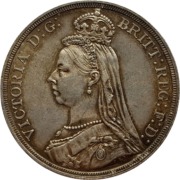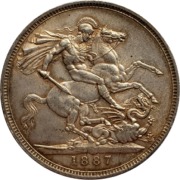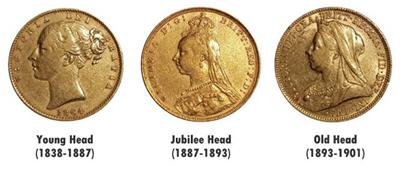 The 1887 Crown - Jubilee Head
The 1887 Crown - Jubilee Head The Obverse shows the Jubilee Bust of Queen Victoria designed by Sir Joseph Boehm and engraved by Leonard Charles Wyon
The Reverse is St George and the Dragon by Benedetto Pistrucci.
 Edge is milled (reeded).
Edge is milled (reeded).A Proof was also issued in this year, mintage: 1000.
Images by permission of M J Hughes Coins.
Mintage: 173,500 (may include coins in sets)
Minted at The Royal Mint
More information (monarch, year, mint, country, category) can be found below coin listings.
Below are some coins currently being offered on eBay. As an eBay Partner, We may be compensated if you make a purchase.
List items on:
List items on:
Remember 1887 ?
The Monarch is Queen Victoria, who in June celebrated her Golden Jubilee for 50 years of her reign. Prime Minister is Robert Gascoyne-Cecil, 3rd Marquess of Salisbury (Conservative). US President is Grover Cleveland (Democrat). St John Ambulance Brigade is introduced. Hammersmith Bridge opens in London. The Hovis process for making breadmaking flour is patented. Celtic F.C. is formed in Glasgow. The first Sherlock Holmes novel A Study in Scarlet by Arthur Conan Doyle is published. Buffalo Bill's Wild West Show opens in London. Glenfiddich single malt Scotch whisky first distilled.
Victoria (1837-1901)
Victoria was Queen of the United Kingdom of Great Britain and Ireland from 20 June 1837 until her death. From 1 May 1876, she adopted the additional title of Empress of India. Victoria ruled for 64 years, a record only recently surpassed by Queen Elizabeth II.Victoria's parents were Prince Edward, Duke of Kent and Strathern, and Princess Victoria of Saxe-Coburg-Saalfeld. She married Albert of Saxe-Coburg and Gotha, who later became known as Prince Albert. Victoria had nine children, the eldest son succeeding her as Edward VII.

Victoria posed for a number of head portraits, but there are generally three major variants: Young Head (1838-1887) by William Wyon, RA; Jubilee Head (1887-1893) by Sir Joseph Edgar Boehm and Old Head (1893-1901) by by Sir Thomas Brock.
Category: Crowns
The Crown is a very old coin, with origins dating back to Henry VIII. The English Crown first appeared in 1526. It was made of 22 carat gold ("crown gold") and has a value of five shillings (a quarter of a pound).By 1551, silver was being used to produce crowns, although gold was sometimes still used. The silver crown was quite large, being about 38mm and weighing about one ounce. Around that time many Europeans countries had similar sized silver coins which made them good for international trade as they were essentially interchangeable.
The metal used was 92.5% silver and the rest copper so as to make the coin harder. This hardness, together with a milled edge, made 'clipping' (which was cutting slices off the edge to steal some free silver) more difficult.
After the Union of England and Scotland in 1707 a new coin, the British Crown, replaced the English Crown and Scottish Dollar. The value was set at 5 shillings and the size was 38mm in diameter and weighed about 1oz as before.
Now more of a commemorative coin
Although the coin was always part of the British coin family, its large size made it unpopular for general circulation and the half-crown was favoured as the de-facto largest coin in circulation. The Crown was more-or-less relegated to a commemorative coin.
The British economy, especially after the World Wars, took its toll on the crown too. From 1816-1919 the crown was 0.925 silver, this was reduced to 0.500 silver in 1920 and in 1947 the Crown became Cupronickel (75% copper, 25% nickel). The size standardised at 38.61 mm and (silver crown) weight of 28.276g (1 oz).
Although not in current circulation, the Crown is still legal tender. After decimalisation in 1971 the Crown was officially valued at 25 pence. In the Eighties we had inflation which brought in higher denomination coins like the pound coin and the two-pound coin, so the Government decided that the crown needed to be restored to it former glory as biggest denomination coin and the crown was re-denominated to £5 in 1990.
Today the Crown is once again made in silver and gold, usually to satisfy collectors and investors. There is a little confusion with this as there are Gold Crowns which are worth £5 but there is another five-pound Gold coin from the sovereign family - see the article on Gold £5 Coin or Gold Crown?
Which Mint: The Royal Mint
The Royal Mint is the designated place for the UK to mint coins. It dates back well over 1000 years and is a Government-owned company. Formed in the reign of Alfred the Great about the year 886, during the period 1279-1812 it was generally referred to as The Tower Mint as it was housed at the Tower of London. The Master of The Royal Mint has included famous figures such as Sir Isaac Newton.
Since 2010 it has operated as Royal Mint Ltd, a company owned by HM Treasury, under an exclusive contract to supply all coinage for the UK although it also produces medals and coins for other countries. It is currently located at Llantrisant, Wales.
Country of Origin: United Kingdom
The United Kingdom (UK) is the Union of England, Scotland, Wales and Northern Ireland. It is often refered to as Great Britain (GBR). It has a long, rich history. The orignal coinage was Pounds, Shillings and Pence but since decimalisation on 15 February 1971, it is £1 = 100p, that is One Pound = 100 pence. The coinage of the UK is also a long history, the Royal Mint being established as long ago as 886AD when coins were hammered. Today there is perhaps 30 billion coins in circulation, and many (numismatic) collectors coins and sets are issued frequently in gold, silver and other metals.








